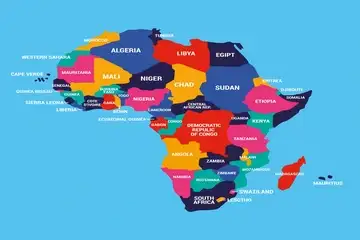Best Air Cargo to African Regions from Dubai UAE
The demand for air cargo to African regions and freight services has been growing steadily, driven by various economic, industrial, and logistical factors. Air Cargo - Air Freight - 3PL - Dangerous Goods - Warehousing service to the African Regions from Dubai UAE
Here’s a comprehensive overview of the current and future demand trends for air cargo and freight in Africa:
African Region Countries:-
| All of the Major Countries of Africa Region : | |
| Algeria | Angola |
| Benin | Botswana |
| Burkina Faso | Burundi |
| Cameroon | Cape Verde |
| Central African Republic | Chad |
| Comoros | Congo |
| Cote D'Ivoire (Ivory Coast) | Djibouti |
| Egypt | Equatorial Guinea |
| Eritrea | Ethiopia |
| Gabon | Gambia |
| Ghana | Guinea |
| Guinea-Bissau | Kenya |
| Lesotho | Liberia |
| Libya | Madagascar |
| Malawi | Mali |
| Mauritania | Mauritius |
| Morocco | Mozambique |
| Namibia | Niger |
| Nigeria | Reunion |
| Rwanda | Sao Tome and Principe |
| Senegal | Seychelles |
| Sierra Leone | Somalia |
| South Africa | St. Helena |
| Sudan | Swaziland |
| Tanzania | Togo |
| Tunisia | Uganda |
| Zaire | Zambia |
| Zimbabwe | |

Cheapest and Best Air Cargo to African Regions from Dubai UAE
Demand for Air Cargo and Freight in the African Region
The African air cargo and freight market is expanding rapidly, influenced by increasing trade, growing economies, and the need for efficient logistics solutions. Here’s an in-depth look at the key drivers and trends shaping the demand for air cargo in Africa:
- Economic Growth and Trade
a. Rapid Economic Development
Several African countries are experiencing robust economic growth, leading to increased demand for air cargo services. Countries like Nigeria, Kenya, Ethiopia, and South Africa are seeing significant industrialization and urbanization, which drives the need for efficient transportation of goods.
- Rising Intra-Africa Trade
The implementation of the African Continental Free Trade Area (AfCFTA) is expected to boost intra-African trade by reducing tariffs and trade barriers. This will enhance the demand for air cargo services to facilitate the movement of goods between African countries.
- E-Commerce and Retail Expansion
a. Growth of E-Commerce
The rise of e-commerce across Africa is contributing to higher demand for air cargo services. As online shopping becomes more prevalent, businesses require faster and more reliable shipping solutions to meet customer expectations and manage inventory.
b. Expanding Retail Sector
The expansion of the retail sector, including both traditional and online retailers, is driving the need for efficient logistics. Air cargo plays a crucial role in ensuring timely delivery of products to meet the growing consumer demand.
- Agriculture and Perishables
a. Export of Perishable Goods
African countries are significant exporters of perishable goods such as fruits, vegetables, and flowers. Air cargo provides a critical solution for transporting these products quickly to international markets, ensuring freshness and quality.
b. Agribusiness Growth
The expansion of agribusinesses and agro-industries across Africa increases the demand for air cargo to move agricultural products and raw materials efficiently.
- Mining and Resources
a. Mineral Exports
Africa is rich in minerals and natural resources, including gold, diamonds, and oil. Air cargo is essential for transporting high-value, time-sensitive shipments of these resources to global markets.
b. Resource Industry Expansion
The growth of the resource extraction and processing industries fuels the demand for air freight services to manage the logistics of equipment, parts, and supplies.
- Humanitarian Aid and Disaster Relief
a. Emergency Response
Air cargo is vital for delivering humanitarian aid and disaster relief supplies swiftly to regions affected by crises. The demand for air freight in this sector remains significant, especially in response to natural disasters and humanitarian emergencies.
b. Health and Medical Supplies
The need for rapid delivery of medical supplies and pharmaceuticals, particularly in remote or underserved areas, drives demand for air cargo services. The COVID-19 pandemic highlighted the critical role of air freight in distributing vaccines and medical equipment.
- Infrastructure Development
a. Expansion of Airports and Facilities**
Many African countries are investing in expanding and upgrading their airport infrastructure, which is expected to enhance air cargo capacity and efficiency. This development is anticipated to support increased demand and improve logistics operations.
b. Enhanced Connectivity
Improved air connectivity between African countries and global markets is likely to further boost the demand for air cargo services, facilitating smoother and more efficient trade routes.
- Challenges and Opportunities
a. Regulatory and Customs Issues
Despite the growth in demand, the air cargo industry in Africa faces challenges such as regulatory barriers, customs delays, and varying standards across countries. Addressing these issues can unlock greater potential for the sector.
b. Technological Advancements
The adoption of advanced technologies, such as digital tracking systems and automated cargo handling, presents opportunities to enhance the efficiency and reliability of air cargo services in Africa.
c. Environmental Considerations
As the demand for air cargo grows, there is an increasing focus on sustainability and reducing the environmental impact of air freight. Innovations in fuel efficiency and greener technologies are important considerations for the industry.
The demand for air cargo and freight services in Africa is on the rise, driven by economic growth, expanding trade, e-commerce, agriculture, and resource extraction. As the continent continues to develop and integrate its markets, the need for efficient, reliable, and flexible air cargo solutions will only grow. Addressing the challenges and leveraging the opportunities in this dynamic sector will be crucial for supporting Africa’s continued progress and connectivity in the global economy.
Cost-Effective Air Shipping from Dubai to the African Region:
A Comprehensive Guide
In the ever-evolving world of international trade, cost-effective air shipping solutions are crucial for businesses aiming to streamline their logistics while managing expenses efficiently. For companies operating between Dubai and the African region, understanding how to leverage air shipping effectively can result in significant savings and operational benefits. Here’s a detailed guide on achieving cost-effective air shipping from Dubai to the African region.
Why Choose Air Shipping for the African Region?
Air shipping offers unparalleled speed and reliability, making it an ideal choice for various types of cargo. Here’s why air shipping stands out:
- Speed: Air cargo is the fastest method of transporting goods, reducing transit times compared to sea or land freight.
- Reliability: With scheduled flights and minimal handling, air shipping offers high reliability and less risk of delays.
- Flexibility: Air cargo services provide flexibility in terms of shipping schedules and routes, accommodating urgent and high-priority shipments.
Key Strategies for Cost-Effective Air Shipping
- Optimize Shipping Volumes
One of the most effective ways to reduce air shipping costs is to maximize shipping volumes. Consolidating shipments allows you to take advantage of bulk rates and lower per-unit shipping costs. Consider the following approaches:
- Consolidation Services: Utilize consolidation services where multiple shipments are combined into one larger shipment, often resulting in reduced rates.
- Frequent Shipping: Regular and predictable shipping patterns can lead to better rates and discounts from airlines.
- Choose the Right Air Freight Forwarder
Selecting a reliable air freight forwarder can significantly impact your shipping costs. Look for providers with:
- Competitive Rates: Compare quotes from different forwarders to find the most cost-effective options.
- Experience with African Routes: Choose forwarders with expertise in shipping to your specific African destinations to ensure efficient handling and compliance.
- Utilize Air Charter Services When Necessary
While air charter services are typically more expensive than regular air freight, they can offer cost savings in specific scenarios:
- Direct Flights: Air charters provide direct flights to remote or underserved locations, reducing the need for multiple transfers and potential delays.
- High-Volume Shipments: For large or high-value shipments, an air charter can be more cost-effective than shipping via multiple commercial flights.
- Consider Seasonal Rates
Air freight rates can fluctuate based on seasonal demand. Plan your shipping around peak seasons to take advantage of lower rates:
- Off-Peak Shipping: Schedule shipments during off-peak times when demand is lower and rates are more competitive.
- Advance Booking: Book your cargo in advance to secure lower rates and avoid last-minute surcharges.
- Leverage Technology and Automation
Modern logistics technology can help streamline the shipping process and reduce costs:
- Real-Time Tracking: Use tracking systems to monitor shipments and avoid costly delays or mismanagement.
- Automated Documentation: Automate documentation and customs processes to reduce administrative costs and errors.
- Understand and Manage Additional Costs
Be aware of additional costs that can impact the overall expense of air shipping:
- Customs Duties and Taxes: Ensure accurate classification of goods to avoid unexpected customs duties and taxes.
- Handling Fees: Factor in handling fees, including packaging and loading/unloading charges, which can add to the overall cost.
- Explore Value-Added Services
Value-added services offered by air freight providers can enhance cost-effectiveness:
- Insurance: Invest in cargo insurance to protect against potential losses or damages, which can be more cost-effective than unexpected claims.
- Packaging Solutions: Use efficient packaging solutions to reduce dimensional weight and shipping costs.
Top Routes from Dubai to African Regions
Dubai serves as a major logistics hub with extensive air cargo routes to various African regions. Key routes include:
- North Africa: Cairo, Casablanca, Algiers
- West Africa: Accra, Dakar
- East Africa: Nairobi, Addis Ababa, Dar es Salaam
- Southern Africa: Johannesburg, Cape Town, Lusaka
- Central Africa: Kinshasa, Libreville, Yaoundé
Cost-effective air shipping from Dubai to the African region involves a combination of strategic planning, efficient use of resources, and selecting the right partners. By optimizing shipping volumes, choosing the right freight forwarder, and leveraging technology, businesses can achieve significant savings while maintaining the speed and reliability of air cargo.
For personalized advice and to explore cost-effective air shipping solutions tailored to your needs, Start Live Chat with SLR Air Cargo for Assistance. Our experts are ready to assist you in navigating the complexities of international logistics and optimizing your shipping strategy.
To know more about our cost-effective air shipping solutions from Dubai to the African Region.
We request to Start Live Chat for Assistance.
